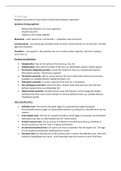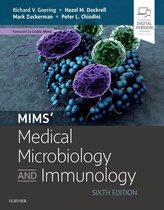Parasitology
Biological associations/ interactions/ relationships between organisms?
Symbiosis (living together)
- Relationship between 2 or more organisms
- Usually long term
- Organisms live closely together
Mutualism – each species has a net benefit + + (Oxpecker and rhinoceros)
Commensalism - one species gain benefits while the other neither benefit nor are harmed + 0 (Cattle
egret and livestock)
Parasitism – one organism, the parasite, lives on or inside another organism, the host, causing it
some harm ()
Parasite classification:
Ectoparasites: lives on the surface of the host e.g. lice, tick
Endoparasites: lives within the body of the host e.g. Plasmodium species, Ascaris species
Permanent (obligate) parasites: cannot live without its host e.g. Trypanosoma species,
Plasmodium species, Trichomonas vaginalis
Facultative parasites: able to survive without the host if alternative food source becomes
available e.g. Candida albicans, Naegleria fowleri, etc.
Pathogenic parasites: it causes a disease in the host e.g. E.hystolytica
Non-pathogenic parasites: mostly harmless, obtains food and protection from the host
without causing harm e.g. Entamoeba coli
Opportunistic parasites: parasites which cause mild disease in immunologically healthy
individuals but they cause severe disease in immune-deficient hosts e.g. Candida albicans,
Toxoplasma gondii
Host classification:
Definitive host: The host for the adult stage of a parasite/most highly developed
form/sexually mature stages of a parasite/fertilization e.g. Mosquito is the definitive host for
malaria
Intermediate host: The host for sexually immature/ larval stage of a parasite/ no fertilization
takes place e.g. Pig is an intermediate host for Taenia solium
Animal reservoir host: acts as sources of infection to the definitive host e.g. Monkeys in
South-east Asia as reservoir host in malaria transmission
Accidental (Incidental) host: Life cycles can not be completed. Not the target host. The eggs
of a fish parasite accidentally swallowed by a human.
Paratenic host: No development of the parasite until it reaches the definitive host. Fish hosts
harbours Diphyllobothrium latum , until eventually eaten by humans or other final hosts
,Terminologies:
Vectors:-Usually arthropods or other living carriers which transmit a disease (vector-
borne disease).
Zoonosis:-Diseases from vertebrate animals to humans.
Endemic–A disease regularly found/always present among particular people or in a
certain area.
Epidemic–Rapid spreading of a disease, may result in deaths.
Pandemic–World-wide spread of a disease (usually a new disease).
Protozoa, Plasmodium
- According to WHO, In 2019, an estimated 229 million cases of malaria occurred worldwide.
An estimated 409 000 deaths from malaria globally In 2019. Pregnant women and children
are most vulnerable.
- Malaria is caused by Plasmodium parasites. The parasites are spread to people through the
bites of infected female Anopheles mosquitoes (malaria vectors) which bite mainly between
dusk and dawn.
- Temporary, facultative ectoparasites.
, Plasmodium falciparum
- Plasmodium falciparum is found globally but is commonest in Africa with over 75% due
to this species. This gives rise to acute infections that may rapidly become life-
threatening. Almost every malarial death is caused by P. falciparum.
- Malaria caused by this species (also called malignant or falciparum malaria) is the most
dangerous form of malaria, with the highest rates of complications and mortality.
- Debilitating anaemia is caused by Chronic infections.
Plasmodium vivax
- Most geographically widespread, produces less severe symptoms. Relapses, however,
can occur for up to 3 years, and chronic disease is debilitating. Once common in
temperate climates
- P. vivax is now found mostly in the tropics, especially throughout Asia.
Plasmodium malariae
- In addition to typical malaria symptoms Plasmodium malariae can persist in the blood for
very long periods, possibly decades, without ever producing symptoms.
- Asymptomatic individuals can infect others, either through blood donation or mosquito
bites.
Plasmodium ovule
rare, can result in relapses, and generally occurs in West Africa.





